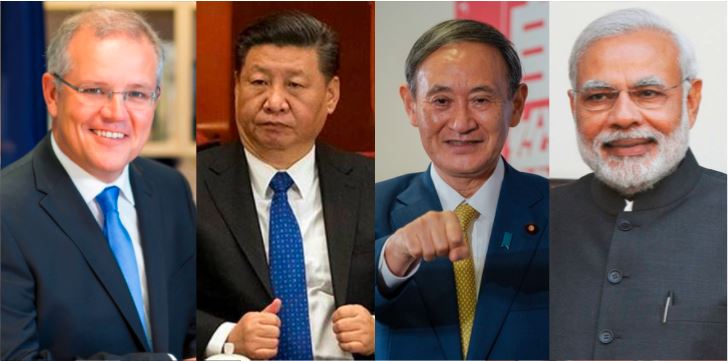On Wednesday, Japan made the big move to approve the world’s largest free trade deal called the Regional Comprehensive Economic Partnership (RCEP), which was sealed last November. The ratification by the Japanese Parliament has therefore sealed Tokyo’s participation in the big trading bloc that includes the ten ASEAN nations, China, South Korea, Australia and New Zealand.
For China, the RCEP is a dream project. Beijing feels that the RCEP will help its exports based economy reap full benefits of trade in the Asia-Pacific region, which represents 30% of the global GDP. Yet, Japan’s RCEP ratification has got overshadowed by a big move to contain China in the Indo-Pacific region. On Tuesday, India, Japan and Australia formally launched the Supply Chain Resilience Initiative (SCRI) to exclude China out of supply chains in the region.
Trade Ministers of India, Australia and Japan held a virtual trilateral meeting, in which the SCRI was formally launched.
A joint statement by the three Trade Ministers read, “The SCRI aims to create a virtuous cycle of enhancing supply chain resilience with a view to eventually attaining strong, sustainable, balanced and inclusive growth in the region. The ministers consented that expansion of the SCRI may be considered based on consensus, if needed, in due course.”
The SCRI is a serious pushback against Chinese hegemony in the region. In 2019, the cumulative GDP of the three-member countries stood at a humongous $9.3 trillion. The trade numbers are also impressive with cumulative merchandise goods and services trade worth $2.7 trillion and $900 billion respectively.
China was not specifically named, but the content of the joint statement made it clear that the ultimate aim of SCRI is to check China’s relentless growth in the region, by diversifying trade and investment in the region.
All three countries comprising the SCRI have shared diplomatic/ military tensions with China over the past one year. The effect of such diplomatic and military conflicts has also spilt over into areas like trade and investment, which is why they are now looking to diversify.
The joint statement added, “Based on the high-level consultations among Australia, India and Japan since September, the ministers noted the importance of risk management and continuity plans in order to avoid supply chain disruptions and affirmed their commitment to strengthen resilient supply chains. Possible policy measures may include: (i) supporting the enhanced utilization of digital technology; and (ii) supporting trade and investment diversification.”
The three Trade Ministers have also decided to convene at least once a year, so as to provide guidance for implementation of the SCRI and also to hold consultations on the further development of the initiative.
China has actually been outfoxed here by both Australia and Japan. It is to be understood that in 2019, Tokyo had conveyed its unwillingness in joining the RCEP if New Delhi decided against joining the free trade zone. Ultimately, India did not join the RCEP given its reservations about China’s exploitative practices and the adverse consequences on some of India’s specific sectors. Also, it seemed as if Sino-Australia tensions would desist Canberra from joining a China-centred RCEP.
However, the RCEP did get sealed last year. Western and Chinese commentators also billed the RCEP as a great Chinese victory. But a few months after the RCEP got finalised, it is becoming clear that Beijing’s two enemies- Australia and Japan are going to sabotage the RCEP from within.
If the object of the RCEP is to develop a strong trading ecosystem amongst the member nations, then Japanese Prime Minister Yoshihide Suga and Australian Prime Minister Scott Morrison would never let RCEP meet its true objective. Now, by formally launching the SCRI, they have made it clear that Canberra and Tokyo are going to diversify trading and investment away from China, as well as the China-centred RCEP. This is bound to make RCEP totally unattractive.
Unsurprisingly, China itself suffered a major meltdown after the SCRI got formally launched. Chinese Foreign Ministry spokesperson Zhao Lijian called the SCRI “unrealistic”. He said, “The formation and development of global industrial and supply chains are determined by market forces and companies choices.”
Lijian added, “Artificial industrial ‘transfer’ is an unrealistic approach that goes against the economic laws and can neither solve domestic problems nor do anything good to the stability of the global industrial and supply chains, or to the stable recovery of the world economy.”
China’s loud reaction does suggest that Beijing is deeply intimidated by the SCRI. It understands how it has been outdone by Australia and Japan, who have made the RCEP obsolete by bringing in a more stable and effective option in the SCRI.
